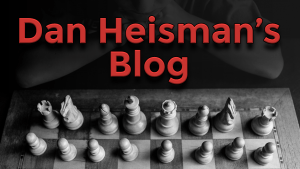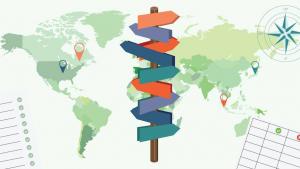Q&A with Coach Heisman Feb 7, 2014
In the recent TCEC computer chess tournament, defending champion Houdini was eliminated in the semi-finals; the engines playing the final match were Stockfish and Komodo. After the finals, the loser Stockfish (an open source program) graciously made their latest free download available as Stockfish DD, in honor of Komodo's programmer Don Dailey, who passed away of leukemia during the competition.
This is a long introduction to the question:
"What is the best defense to Scholar's Mate?"
And I forgot the answer! After 1.e4 e5 2.Qh5 Nc6 3.Bc4 I knew the top two moves were 3...g6 and a queen move 3...Qe7 or 3...Qf6. But was blocking the bishop with 3...Qe7 or blocking the knight with 3...Qf6 better? I misremembered and replied "3...g6 or 3...Qf6" but the right answer, according to a 28 ply search by the 3200-rated Stockfish DD, is 3...g6 followed by 3...Qe7. In fact, 3...g6 is the only defense which Stockfish DD rates as giving Black a slight advantage! It evaluates 3...Qe7 as only equal. I am happy to report that I almost always replied 3...g6 when someone tried to Scholar's Mate me...
"What game that you played is your favorite or most memorable?"
Thanks for this question. I already published on Chess.com a series commemorating the 40th anniversary of my most prestigious tournament victory, in the 1973 Greater Philadelphia Invitational Championship. My final round victory over the late FM Boris Baczynskyj was covered in this blog.
That likely was my most important victory, but many of my memorable victories, such as my complex win over John Yehl in the 1968 Keystone State tournament, are covered in my book The Improving Annotator. BTW, the Keystone State was my coming out event: I started 5-0 even though I was in the bottom half of the pairing list (rating 1716) and almost all the top area players were competing! The Yehl game was my first one published in Chess Life.
Let's see if I can present a game that was not covered in either the 1973 event blogs or in the book, which also contains such memorable contests as my time-scramble win over soon-to-be IM Jon Peters, which earned me the USCF Expert title at the Merrimac Grand Prix in 1969.
Here is the win over Tim Lee which "re-gained" my master title (for more on this, check out The Improving Annotator) in the 1980 Franklin-Mercantile Expert-Masters Invitational:
Once again a viewer asked about whether Deep Blue cheated against Kasparov in the 1997 match. I worked at both Deep Blue matches and there's so much evidence (from my point of view) that Deep Blue did not cheat that's it's not even a question; I cover this in more detail in my writeup on the Sep 27 show. Also, see Deep Blue team leader Dr. Hsu's book Behind Deep Blue.
Got quite a few questions this week about learning tactics. I think by now most of my readers know that I subscribe to the Soviet method suggesting repetitive study of easy tactics first, treating the ~2,000 common and easy patterns like one does multiplication tables. For additional information, check out:
- A Different Approach to Studying Tactics
- Tactical Sets and Goals
- My list of basic tactics books which contain these type of problems
 ).
).Penn State's Fight against Breast Cancer will be supporting an online auction at www.charitybuzz.com Proceeds fund breast cancer research and educational programs at Mount Nittany Medical Center, Penn State Hershey Cancer Institute, PA Breast Cancer Coalition, the Kay Yow/WBCA Cancer Fund and J.C. Blair Memorial Hospital. Thanks to permission from Chess.com, we are now auctioning off a guest appearance on "Q&A with Coach Heisman" for this cause. The winner will be invited to my home in Wynnewood, PA, to be a guest on a future show. To see the auction or bid (the auction is live til Feb 27) take this link.
----------------------------------
PS 1)The first bid to be a guest on the show is in - $100
2) I wonder what caused the Chess.com software to make the date of this posting Jan 1, 2000?



